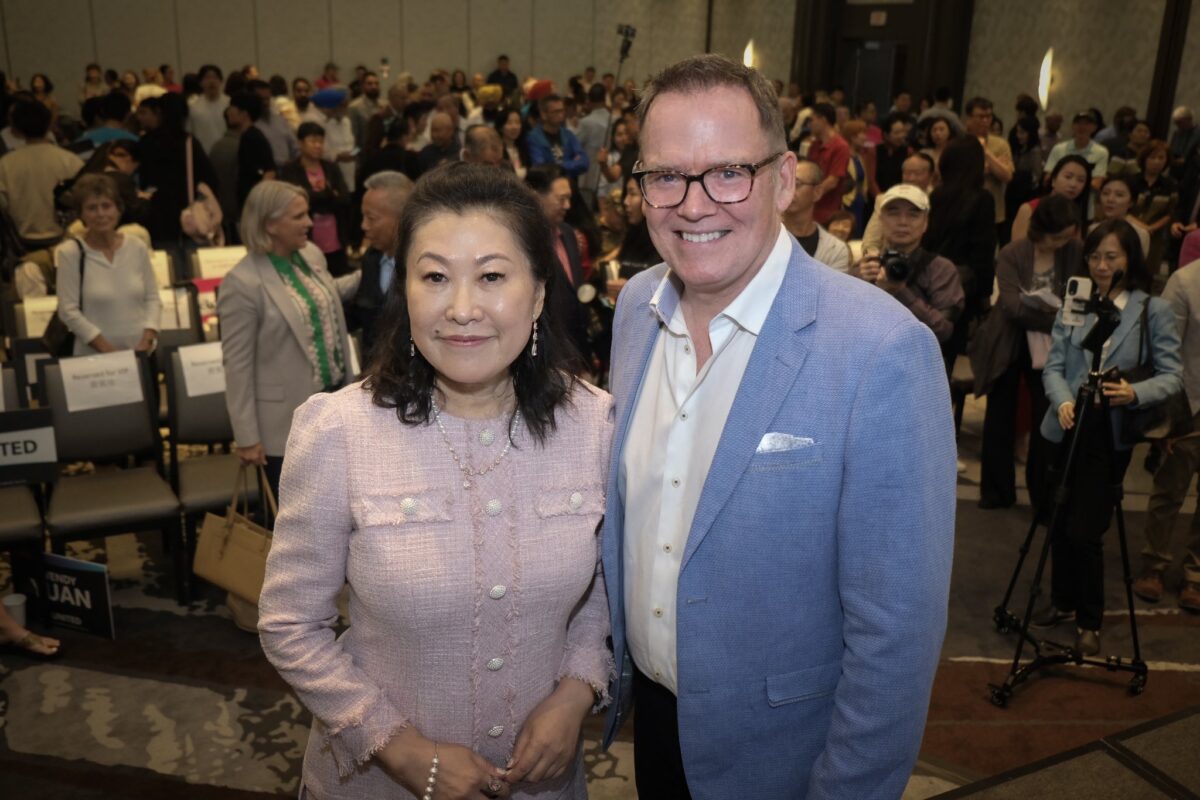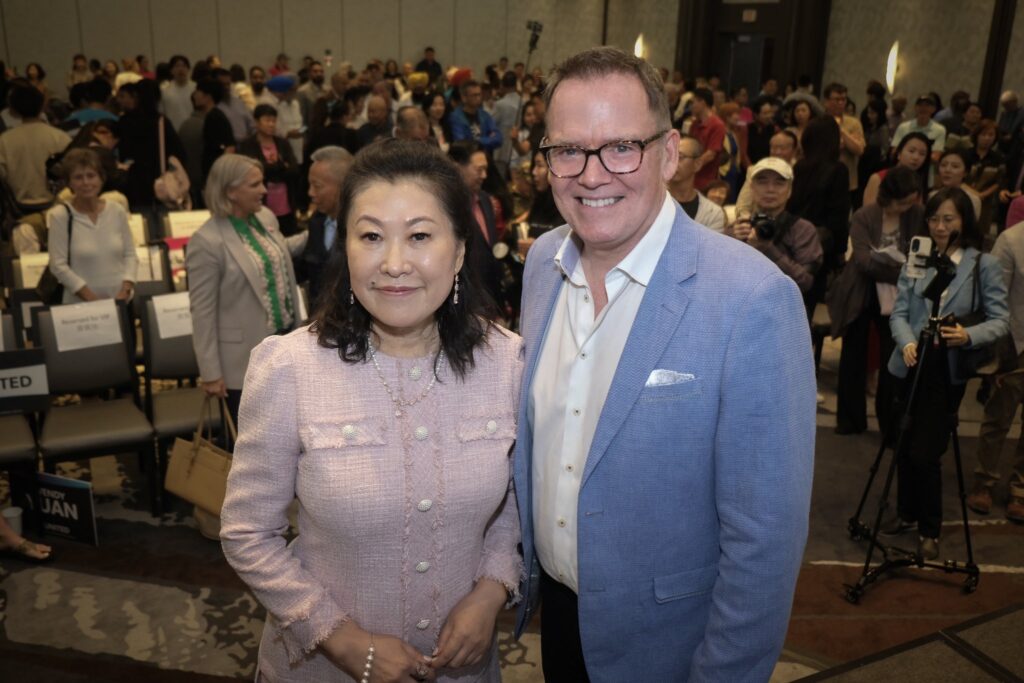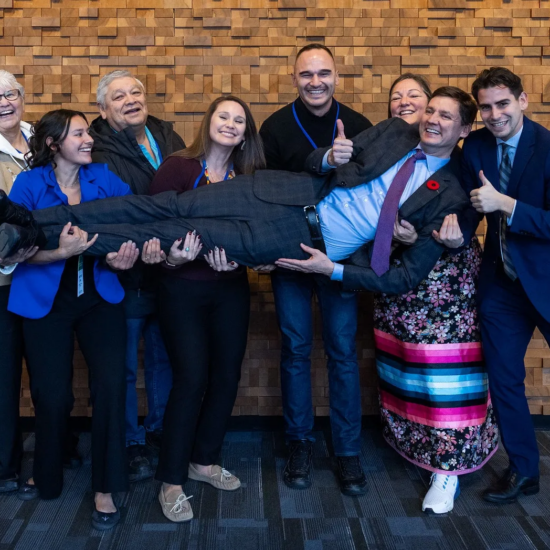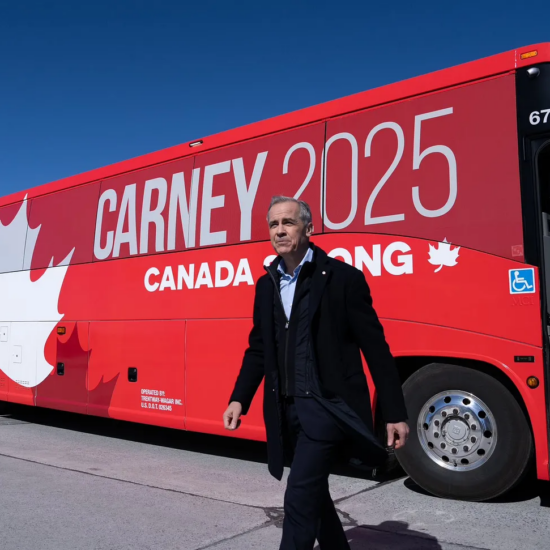
Bob Mackin
BC United leader Kevin Falcon promised alumni of China’s flagship university that he would forge closer ties with China if he becomes premier after the next election.
Falcon told an Aug. 27 meeting at the University of B.C., hosted by the Guanghua Vancouver Alumni Association of Peking University, that he would restore the standalone trade offices the NDP government closed in late 2019, according to a summary by the event’s host.

BC United leader Kevin Falcon (right) with Richmond-Centre candidate Wendy Yuan (Kevin Falcon/Twitter)
“He strongly praised the outstanding contributions made by Chinese in Canadian history, focusing on the Asia-Pacific Portal and Corridor Program he participated in, and was committed to maintaining and expanding Canada’s trade with the Asia-Pacific region, including China,” said a translation of Zhang Jiawei’s WeChat post. “At the same time, it regrets that the current British Columbia government has closed 13 offices in the Asia-Pacific region, including four Chinese offices, and promised that if BC United is in power, it will resume the establishment of these offices and play their due positive role.”
Zhang is a co-founder of the 1029 Cafe crowdfunding club in Richmond and the Chinese Canadian Heritage and Future Foundation.
Macdonald-Laurier Institute senior fellow Charles Burton, a former Canadian diplomat in Beijing, said Falcon’s speech was notable for two reasons: the audience and the message.
“This kind of venue is designed to expand China’s influence in Canada through rallying alumni of Chinese institutions, of which I’m one myself, Fudan University,” Burton said. “This speech has been given to a certain audience and he did not suggest that, under his government, that B.C. would follow the Canadian government policy of expanding into the Trans-Pacific Partnership and following the Indo-Pacific policy of trying to diversify our trade exposure, away from possible Chinese economic coercion or monopoly of certain key elements in high tech.”
Falcon, Burton said, would have been more consistent with federal policy had he suggested that B.C. retain officers inside Canadian diplomatic missions in China and expand operations in other markets, “to try and prevent B.C. from becoming too beholden to [People’s Republic of China] political interests. So, I’m puzzled by by his assertion.”
Neither Falcon nor BC United caucus press secretary Andrew Reeve responded to interview requests.
At the end of 2019, then-NDP Jobs, Trade and Technology Minister Bruce Ralston announced closure of B.C.’s contracted offices in 13 cities across Asia, in favour of embedding staff in Canadian embassies and consulates.
B.C. now has four trade offices at diplomatic missions in China (Beijing, Shanghai, Guangzhou and Chongqing), four in India (Delhi, Mumbai, Chandigarh and Bangaluru), Tokyo, Seoul, Manila, Jakarta, Singapore, Ho Chih Minh City and Taipei.
When the BC Liberal Party, the predecessor of BC United, was in power, the government spent $8.4 million over three years to rent and resource an office in Beijing’s Kerry Centre. That was according to a 2017 paper by entrepreneur and podcaster Andrew Johns, based on freedom of information disclosures. From 2013 to 2016, Ben Stewart served as B.C.’s Beijing-based, special trade representative to Asia. Premier Christy Clark gave Stewart the $150,000-a-year salary plus expenses after he stepped aside so she could win the West Kelowna by-election and return to the Legislature after losing Vancouver-Point Grey to Eby in 2013.
During those three years, the B.C. government helped broker a research and development deal between Telus and Huawei, signed a memorandum of understanding to enable a Surrey logistics warehouse under Xi Jinping’s Belt and Road Initiative and lured an arm of state-owned conglomerate China Poly Group to open a Richmond office and Vancouver gallery.
Poly Culture quietly closed its doors early this year and Telus’s Huawei partnership dissolved due to national security concerns in the wake of the Meng Wenzhou extradition saga.
Analysis by the University of Alberta’s China Institute showed B.C. exports to China fell 4.53% to $8.66 billion last year, but imports grew 20.59% to $21.65 billion. The report noted the economic and geopolitical impacts of the Chinese Communist Party government’s “zero COVID” lockdowns until late November protests, Xi’s refusal to condemn ally Vladimir Putin’s war on Ukraine and ongoing threats to forcefully invade and annex Taiwan.
In August, China left Canada off its latest list of approved destinations for tour groups.
Aug. 27 event headliner Prof. Li Qi from Peking University’s Guanghua School of Management, gave a two-hour speech on “Global Change and China’s Development” to the 350 attendees. Falcon was not the only politician there. His Aug. 25-announced BC United candidate for Richmond-Centre, Wendy Yuan, and Burnaby Coun. James Wang, a former NDP candidate, were also in attendance.
When Yuan’s candidacy was announced in Richmond, the crowd included James Wu Jiaming of the Canada-China City Friendship Association and Dawa News publisher Zaixin Ma, both frequent attendees of Chinese consulate events.
Support theBreaker.news for as low as $2 a month on Patreon. Find out how. Click here.











